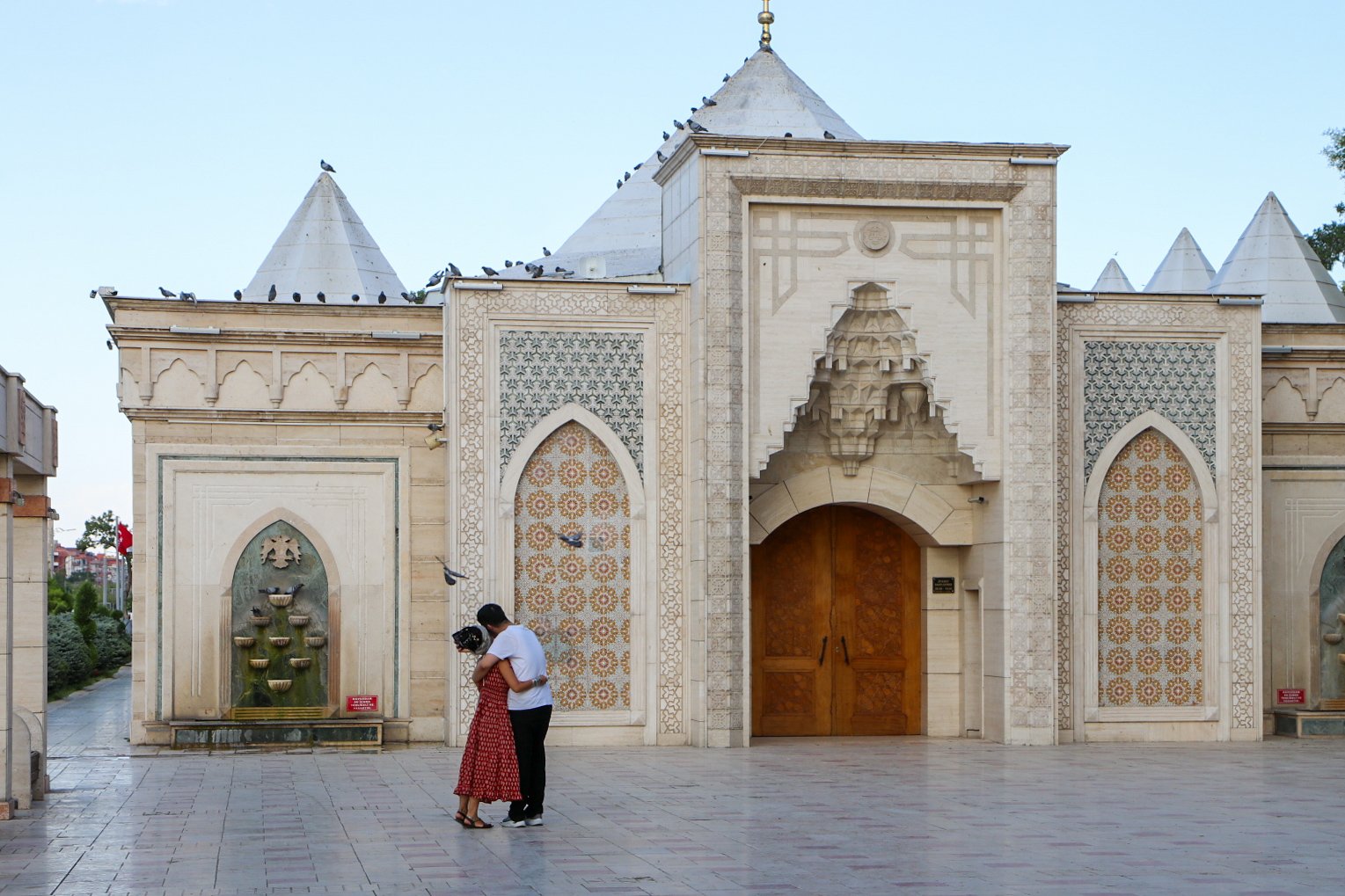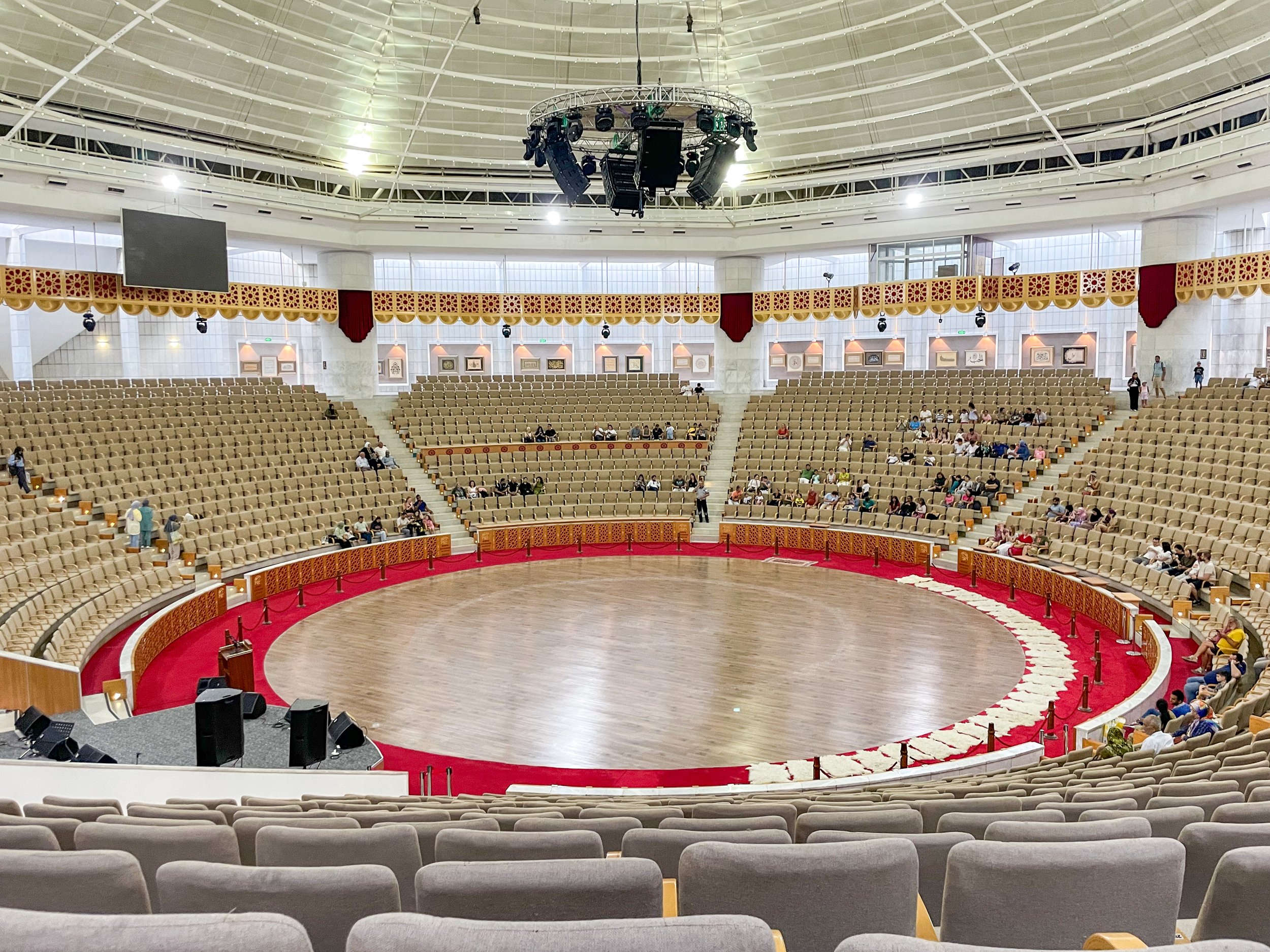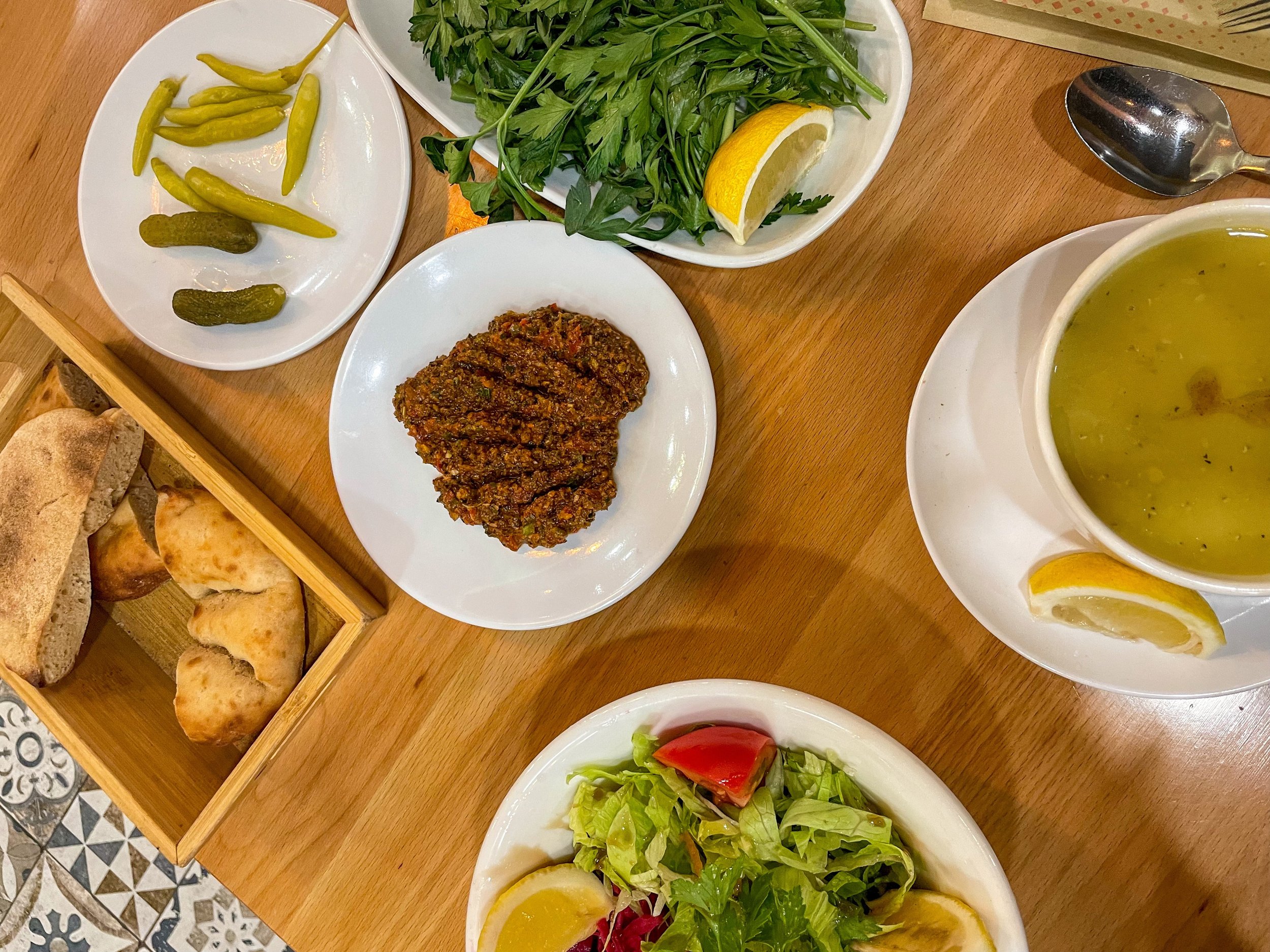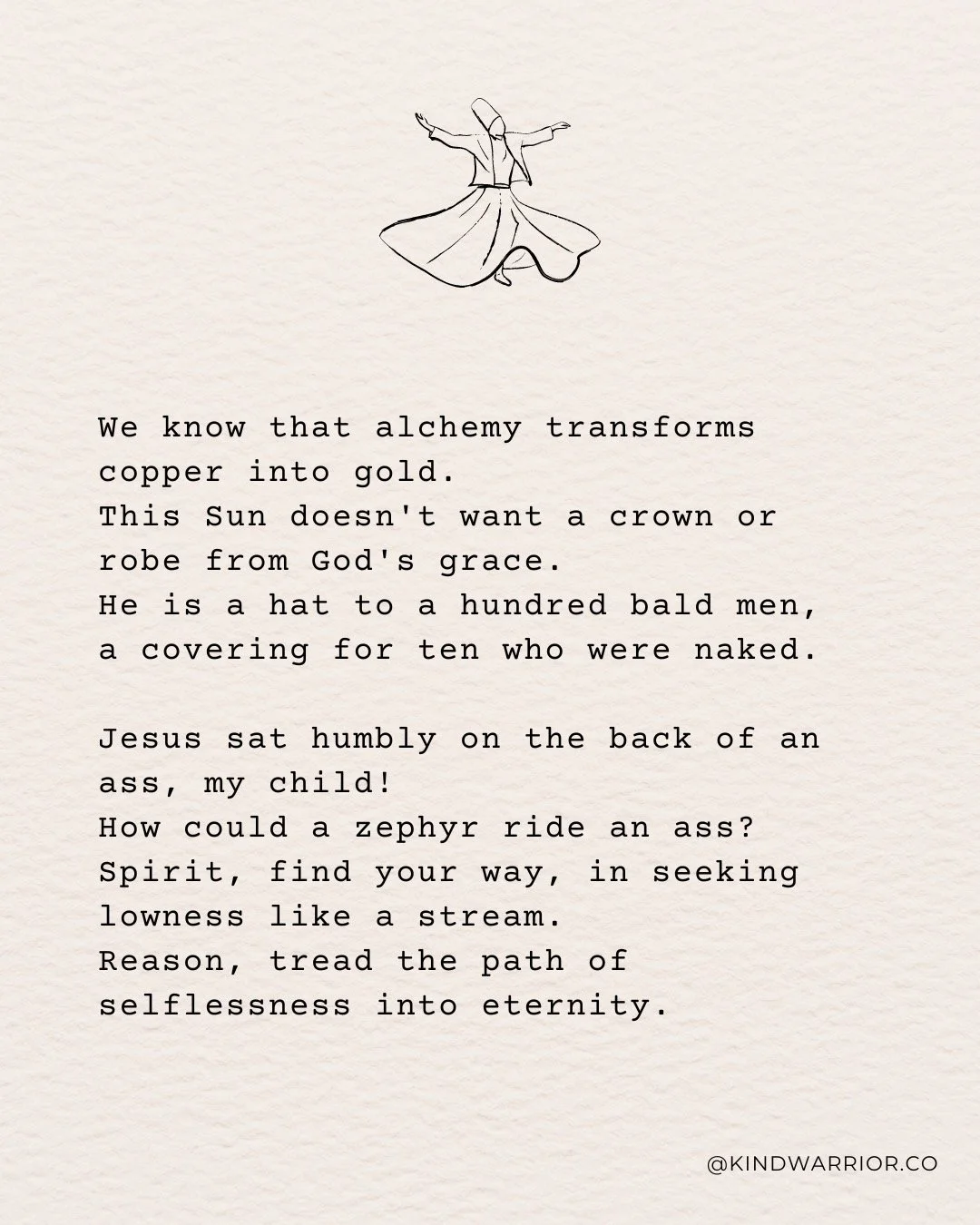Rumi’s Tomb & Whirling Dervishes in Konya, Türkiye (2024)
I stopped in Konya, Türkiye for 24 hours on my way from Cappadocia to Antalya. “Konya is probably best known as the final resting place of 13th-century Sufi mystic and poet Celaleddin Rumi (later known as Mevlâna). As well as being a renowned Islamic scholar, Rumi launched the Mevlevi Order of the Whirling Dervishes.” (cnn.com)
“Jalāl al-Dīn Muḥammad Rūmī (Persian: جلالالدین محمّد رومی), or simply Rumi (30 September 1207 – 17 December 1273), was a 13th-century poet, Hanafi faqih (jurist), Islamic scholar, Maturidi theologian (mutakallim), and Sufi mystic originally from Greater Khorasan in Greater Iran.” (wikipedia.com)
24 Hours in Konya
Friends in Unlikely Places
Upon arriving in Konya from Göreme by bus, I proceeded to get lost, which could have been unfortunate but it ended up having its magic.
I arrived mid-day at the bus station in the northern part of the city. Google Maps gave me many public transportation options. I flagged down a friendly-looking young woman traveler (she was wearing a backpack, I dunno) to ask her how she thought I should best get to the city center. She advised catching a minibus on a busy street a short walk away so I headed that way. I let many pass that didn’t seem to head to the city center then finally flagged one down, asking the driver if that’s where he was heading. A minibus, by the way, is exactly as it sounds; it’s maybe more of a large van in some cases. The price of a ride is cheaper than a taxi, but more than a full bus fare (makes sense, right?). When he told me to get off at the nearest shopping center, a bustling mall no closer to downtown, we both realized that we had misunderstood each other. He very kindly and apologetically gave me my cash back and pointed in the direction of a corner where I could get the right van.
I opted for a regular bus instead since the whole minibus thing had let me down—it was difficult to read the destinations posted on the front window since I neither spoke Turkish nor knew the landmarks of Konya. The unfortunate thing about the regular bus was that I had to transfer to another one, adding more time to my trip. Since I was only there 24 hours, I wanted to get where I was going quickly. The buses were very clean and convenient, accepting Apple Pay with a quick iPhone scan at the front.
I boarded a bus and it meandered through what looked like a nice middle-class neighborhood of Konya. Streets were tree-lined and homes were modest but beautifully kept. I could have been anywhere in middle suburban America were it not for the women on the sidewalks fully draped with generously covering hijabs, the traditional Muslim head scarf, covering their ears and necks. I felt safe from judgment but more than a little out of place—this wasn’t a tourist neighborhood or even a tourist city, really. I read that Koyna is one of the most religiously conservative places in Türkiye, with no bars and limited places to purchase alcohol. I always tried to dress modestly in this country but on this mid-July day, the heat was overwhelming. My shoulders and arms were bare in a black tank top. Black cotton elastic-waisted pants covered my lower half. I scanned the streets while riding through the neighborhood. Am I cool or nah? I saw that some women wore less clothing than others—some with the head scarves, some without.
Bus #1 dropped me off and I walked the block to my transfer point to wait for the next bus. Soon, a covered woman, maybe 25 years my senior, joined me at the bus stop. We waited a long time and even though we didn’t speak the same language, didn’t come from the same place, culture, or generation, and could not have been dressed more differently, her with her hijab and me with my tank top, we exchanged exasperated glances, commiserating with each other. Feeling exasperated while waiting for a late bus is a human experience.
There were two bus options—one on the side of the street where we were standing, and one across the street—a grassy median and 4 lanes of traffic had to be crossed to get to that one. It was unclear which bus would come first—both would get me to the city center but on different routes. The woman finally decided she’d had enough waiting at our stop and made the dash to the one across the street. We waved at each other. I added a shoulder shrug. Who knew which the right choice. She mirrored me, shrugging back.
We both waited as though in competition: which one of us was right? Which bus would come first?
It was mine! I waved her over: come back! She rushed back across the street and we both got on, laughing together, communicating in this universal language. For this half an hour on a Saturday in July, half way around the world from where I was from, I’d made an unlikely friend—and only because I’d taken the wrong bus. This is why I love Sartre’s definition of adventure, featuring it at the top of the Travel section of this website, so much:
“What sort of adventures?' I asked him, astonished.
‘All sorts, Monsieur. Getting on the wrong train. Stopping in an unknown city. Losing your briefcase, being arrested by mistake, spending the night in prison. Monsieur, I believe the word adventure could be defined: an event out of the ordinary without being necessarily extraordinary.” — Jean-Paul Sartre, Nausea
These magical, chance moments are why we travel. We are reminded that we all have similar lives when you get down to it. We all have to wait as we journey from one place to another. We all have to test our propensity for impatience. We all must do tedious things. I’m reminded of the book by Buddhist scholar Jack Kornfield After the Ecstasy, The Laundry. “Enlightenment is not an end goal; it is just another moment in time.” These moments of small connection are enlightenment itself.
There was more magic in store…
Think Hotel
I finally made my way to the city center and was hauling my luggage to my hotel. A man stopped me in the street, which always makes me guarded and wary. As a female solo traveler in unfamiliar lands, I have to stay vigilant. He wanted to have a conversation with me about why I was visiting his city and where I was traveling from. I engaged a little but tried to shrug him off. He seemed nice enough but I couldn’t risk it. His parting words were, “Buy rugs while you’re here.” Buy rugs here? What an odd thing to make sure to tell a stranger on the street. Of course, Turkish rugs are known throughout the world for their beauty but why this message now? Random.
I dragged my bags for a mile in the heat, praying for an available room and generous air conditioning at the hotel I’d identified on Google Maps as the one for me. I didn’t have a reservation.
The hotel, Think Hotel, was even more charming than it looked online and the woman working the front desk was exceptionally friendly and welcoming. I negotiated the rate I wanted to pay, which was still much more than I liked to pay per night on this nomad year. There weren’t any hostels in Konya. The hotel was a splurge. (I just looked it up and it’s $53 a night, which after staying in Paris for the month of August and Scotland in September feels sooo affordable. #perspective).
It was gorgeous! I wanted to move in there. First of all, there was a costume shop at the entry with fun dresses, tops and coats for sale: sequins, funky fabrics, wild colors, and interesting patterns...how random and thrilling! Everything was chaotically and colorfully painted, including a black and white checkered floor reminiscent of The Love Shack featured in the B-52s music video from 1989.
Whirling Dervishes
The whirling dervish performances happen daily at the Mevlana Cultural Center except for one week in December. I think they happen at 7pm but I had asked the woman working at the reception at my hotel and she knew.
Sufi whirling (or Sufi turning) (Turkish: Semazen borrowed from Persian Sama-zan, Sama, meaning listening, from Arabic, and zan, meaning doer, from Persian) is a form of physically active meditation which originated among certain Sufi groups, and which is still practiced by the Sufi Dervishes of the Mevlevi order and other orders such as the Rifa'i-Marufi. It is a customary meditation practice performed within the sema, or worship ceremony, through which dervishes (from the persian Darvish Persian درویش also called semazens, from Persian سماعزن) aim to reach greater connection with Allah. This is sought through abandoning one's nafs, ego or personal desires, by listening to the music, focusing on God, and spinning one's body in repetitive circles, which has been seen as a symbolic imitation of planets in the Solar System orbiting the Sun.
As an order, the whirling Dervishes were founded by mystic poet Rumi in the 13th century. Initially, Sufi fraternities (Arabic: طرائق, romanized: ṭarāʾiq) were organized as leaderships where members followed prescribed disciplines in service to a sheikh or master to establish trust with him. A member of such a fraternity is referred to as a Persian darwish.(wikipedia)
Watching them was enchanting! I imagine the dancers get into a meditative trance, feeling at one with God. I could see the complete focus required to whirl around in the designated order in the practiced path, all synchronized. This was a spiritual experience as they transmitted their inner peace and oneness with God to all of us—or to those of us who were receptive. I limited my photo and video-taking so I could be present.
Walking around the neighborhood of Konya between my hotel and the Mevlana Cultural Center, there were many stately buildings and mosques. Everything was pristine and seemed to be exceptionally well taken care of if not brand new.
Paşa Dairesi Chocolate Shop
After attending the performance, I wandered through Konya. I found an enchanting chocolate shop. I asked the men working there if they had sugar-free chocolate. They did! They showed me the sugar-free chocolate and told me that in the future, while in Türkiye, I could look for the words “şeker ilavesiz” to indicate sugar-free on food items.
Dinner - Sifa Restaurant, Konya
I got dinner next door to my hotel and it was so good. Not pictured was a giant pizza with roasted peppers. This is lentil soup, salad, a giant plate of parsley, fresh bread, and pickles. I ate it all and I felt so stuffed and content. There are some solo travel moments like this where everything falls just into place and even the food tastes better. There’s no one to shame you about eating too much. You can take as much time as you want. I felt so fully alive and present in this city off the Western tourist path. Everyone was so kind and friendly. I saw a beautiful performance. I interacted with strangers. My hotel was gorgeous and comfortable (especially after months of hostel beds).
Everything was just right.
Also, I put this parsley on my pizza and I need to remember that for the future because it was great.
Turkish Rugs at Gallery Selcuk
After the dervish performance, after wandering through town, after buying sugar-free chocolate, and after dinner, I walked past a shop with interesting things in the window and a cute cat out front. I stopped to look both at the cat and in the window and the shop owner came out and convinced me to come inside and look at the rugs for sale. I don’t have the budget, the home, or the space in my luggage for rugs so I’m surprised he convinced me. But he was very kind, introducing himself as Mustafa—he was not as pushy as other shop owners, so I felt more comfortable.
He explained that he’s been running the store for many decades and before that, his dad ran the rug sale business, which he founded. He explained that all the rugs were woven by hand and that they were all vintage, at least 20 years old but often much older. He said that rugs are not being woven by hand anymore because it’s so labor intensive and it makes them very expensive.
My mom’s birthday was coming up so I told him I’d talk to my brother about buying her a rug. He said he could ship it FedEx. My brother agreed this would be a great gift. Mustafa convinced me that buying multiple rugs made more sense (he was a great salesman!) since it could all be shipped together.
The haggling was very stressful—not my favorite activity! Eventually, I picked out two small rugs, about 2 1/2’ x 4’, one for each of our parent’s birthdays. Each rug was $250 and he offered free shipping. I was nervous that they wouldn’t get shipped. He showed me past FedEx shipping labels. “I ship all over the world all of the time!” he assured me, “I have great rates with FedEx.” In retrospect, $500 is not a huge amount of money, but as a budget traveler, it was a lot more than I was used to spending on anything.
Not only did he ship the rugs, but he must have the agreement of the century with FedEx. He shipped them on a Monday and they traveled half way around the world, from Konya, Türkiye, to the small California town of Grover Beach in FOUR. DAYS. They arrived Thursday. Sorcery.
Our parents loved them! They are so unique and beautiful. They were great gifts. So random that a stranger on the street told me to buy rugs while in Konya. I guess he planted a seed but I wasn’t expecting to be drawn into this small rug shop. It was all very mystical-feeling. When in the city of mystics, I suppose!
Rumi’s Resting Place
In 2015, I embarked on a personal quest to appreciate more beauty. I bought several poetry books and dedicated time to reading poems. One was the collected works of Rumi, considered to be one of the most popular poets in the world.
It’s important to note that quite a few pop quotes attributed to Rumi…he didn’t exactly say those. The main translater who created the Rumi translations that English-speakers know today…he took some liberties. A 2017 New Yorker piece outlines the specific erasure of Islam.
Omid Safi, a professor of Middle Eastern and Islamic studies at Duke University, says that it was in the Victorian period that readers in the West began to uncouple mystical poetry from its Islamic roots. Translators and theologians of the time could not reconcile their ideas about a “desert religion,” with its unusual moral and legal codes, and the work of poets like Rumi and Hafez. The explanation they settled on, Safi told me, was “that these people are mystical not because of Islam but in spite of it.”
More recently, a translater worked to modernize the Victorian-era translations.
When I asked him about this, he told me that he couldn’t recall if he had made a deliberate choice to remove Islamic references. “I was brought up Presbyterian,” he said. “I used to memorize Bible verses, and I know the New Testament more than I know the Koran.” He added, “The Koran is hard to read.”
One such liberty involves this very often quoted verse:
Rumi used the Koran, Hadiths, and religion in an explorative way, often challenging conventional readings. One of Barks’s popular renditions goes like this: “Out beyond ideas of rightdoing and wrongdoing, there is a field. / I will meet you there.” The original version makes no mention of “rightdoing” or “wrongdoing.” The words Rumi wrote were iman (“religion”) and kufr (“infidelity”). Imagine, then, a Muslim scholar saying that the basis of faith lies not in religious code but in an elevated space of compassion and love. What we, and perhaps many Muslim clerics, might consider radical today is an interpretation that Rumi put forward more than seven hundred years ago.
The same type of discussion around how to translate ancient texts happens with The Bible as well. But it’s interesting that every time I see a Rumi quote that seems too modern, I think, “Is that what he was saying? Seems wildly modern in its phrasing.” I think it’s a little of both—no he did not exactly say that but translators tried to capture the essence for modern audiences.
Regardless, it was some sort of religious or spiritual experience to see Rumi’s tomb. His poems brought me much-needed softness and healing. They opened my heart to mysticism and contemplation of the wonders of being alive.
His tomb is housed in the Mevlana Museum, which was about 2 blocks from my hotel. It’s free to visit.
A website I found, Dar al Masnavi, about Rumi’s Tomb says:
Only some people are able to feel the holy presence in front of them while standing before the tomb of Hz. Mevlânâ. Among those people who do not feel it are some who have the ability to experience it but do not know it because, either they have not paid sufficient attention or concentration to the invisible presence in front of them or perhaps they have been distracted by the sheer physical beauty of this part of the mausoleum. These are advised to try the following exercise: (1) make an effort to believe that there really is a powerful spiritual presence of Hz. Mevlânâ in front of you; (2) visualize wires or filaments or tendrils extending from your heart to the tomb of Hz. Mevlânâ (keeping in mind that his grave is in the ground beneath the decorated sarcophagus); (3) make an effort to feel love toward the spirit of Hz. Mevlânâ, while maintaining the visualization of connection; (4) make an effort to feel the holy presence in front of you while concentrating and visualizing for at least twenty minutes; (5) if you do not feel anything significant, rest and then repeat the exercise for another twenty minutes, and so on.
I felt the holy presence! I felt tears welling up as I stood viewing his beautiful tomb. It was so surprisingly overwhelming! I took deep breaths to stay grounded. I could see that many around me felt this reverent energy as well. We were all mesmerized.
There was something I was feeling about being in the presence of someone who dedicated their life to presence. Rumi wanted people to understand that each moment was God itself—each moment could be magic if we stopped to feel it.
Rumi Poems:
My friend and podcast cohost Anne sent me her favorite Rumi poem, Be Lost in the Call:
Lord, said David, since you do not need us,
why did you create these two worlds?
Reality replied: O prisoner of time,
I was a secret treasure of kindness and generosity,
and I wished this treasure to be known,
so I created a mirror: its shining face, the heart;
its darkened back, the world;
The back would please you if you've never seen the face.
Has anyone ever produced a mirror out of mud and straw?
Yet clean away the mud and straw,
and a mirror might be revealed.
Until the juice ferments a while in the cask,
it isn't wine. If you wish your heart to be bright,
you must do a little work.
My King addressed the soul of my flesh:
You return just as you left.
Where are the traces of my gifts?
We know that alchemy transforms copper into gold.
This Sun doesn't want a crown or robe from God's grace.
He is a hat to a hundred bald men,
a covering for ten who were naked.
Jesus sat humbly on the back of an ass, my child!
How could a zephyr ride an ass?
Spirit, find your way, in seeking lowness like a stream.
Reason, tread the path of selflessness into eternity.
Remember God so much that you are forgotten.
Let the caller and the called disappear;
be lost in the Call.
O incomparable Giver of life, cut reason loose at last!
Let it wander grey-eyed from vanity to vanity.
Shatter open my skull, pour in it the wine of madness!
Let me be mad, as You; mad with You, with us.
Beyond the sanity of fools is a burning desert
Where Your sun is whirling in every atom:
Beloved, drag me there, let me roast in Perfection!
All Poetry offers this AI analysis: “This poem encapsulates the speaker's ardent desire for a state of divine madness, transcending the limitations of reason. The plea to shatter open the skull and pour in the wine of madness echoes themes of Sufi mysticism, where intoxication becomes a metaphor for the ecstasy of union with the divine.
Compared to the author's other works, this poem shares a common thread of longing for the divine and the mystical. It aligns with the central tenets of Sufism, which emphasize the importance of love, devotion, and direct experience of God.
Within the context of its time period, this poem aligns with the broader spiritual and philosophical currents of 13th-century Persia. It resonates with the mystical experiences and longing for divine connection that were prevalent among Sufis and other spiritual seekers during that era.”















































